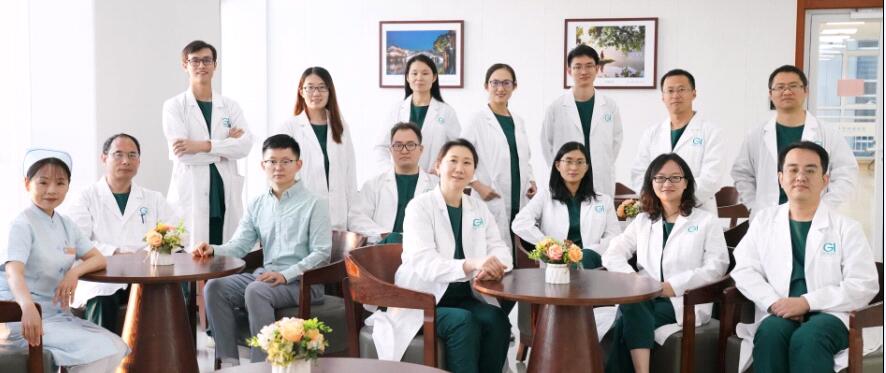
General Introduction
The department of gastrointestinal medical oncology was built in Oct 2006, focusing on treating various types of malignancy, especially esophageal cancer, gastric cancer, colorectal cancer, pancreatic cancer, liver and biliary tract cancer with chemotherapy and immunotherapy. The staff includes 13 doctors and 15 nurses, dealing with 65 beds in the department. We have set up a professional team rich in clinical practice, treating the patients individually under the MDT principle, keeping up with the latest development of cancer, and driving the field also. The number of patients we treated has increased quickly over the last four years. We had treated nearly 20,000 patients per year. A lot of patients have received benefits from the individualized therapy. As one of the most active force in the field of oncology, we have launched and taken apart into a lot of international or national multicenter clinical trials, providing many promising and advance chances for patients with cancer. The staffs have been in charge of and involved into many scientific researches, continuously published their findings in various professional journals, and exchanged the information with different famous cancer centers and institutions colleagues.
Our clinical cancer research effort pushes the development of personalized treatment and is aimed at improving patient outcomes. We have more than 40 international or national multi-center clinical trials open testing new anti-tumor drugs or new therapeutic schedule.
Take immunotherapy for example, several immune checkpoint inhibitors are approved for certain cancers, while others are only offered through clinical trials. However, only 20% of tumors can respond to immune monotherapy. To extend the benefits of immunotherapy, our team is leading and participating research to identify new and more effective ways to improve the immune response to cancer. Besides, we have also carried out clinical trials of other new drugs that suppress tumor proliferation or inhibit tumor angiogenesis.
In total, hundreds of patients were enrolled into clinical trials every year. The results of our clinical trials are presented in international and national congresses and published in top journals. Some new drugs that we explored, such as Apatinib, have completed clinical trials and been successfully marketed.
Translational Research
Our translational research facilitates the movement of new ideas and results from the laboratory to the clinic, as well as the movement of clinical observations from the clinic to the laboratory.
On the one hand, we have innovatively identified a series of serum miRNAs as diagnostic and predictive biomarkers for cancers in the digestive system, and deeply explored their underlying mechanisms. Based on our research on the role of miRNAs in gastric cancer, our team developed a diagnostic kit for gastric cancer and successfully marketed it. By virtue of our excellent academic achievements in this area, our team has received various awards from many national institutes.
On the other hand, we found a high incidence of drug resistance in clinic, we explored it and then found the role of miRNAs and exosomes in it. Onco-miR-214 promotes chemo-resistance in gastric cancer by targeting a list of genes. Exosome delivered anti-sense oligonucleotides can reverse chemo-resistance by inhibiting miR-214 and up-regulating anti-cancer genes. The more effective strategies by using exosomes to reverse drug resistance is under investigated.
Basic Science
Our team focused on the role of exosomes and miRNAs in the metastasis of gastrointestinal cancers, and achieved a lot of innovative results. For example, we identified that EGFR-containing exosomes derived from cancer cells could favor the development of a liver-like microenvironment promoting liver-specific metastasis. Cachexia is common in cancer patients. We make great attempts to explore the relationship between exosomes and metabolic abnormalities occurred in cancer patients. Recently, we found that exosomal circRNA derived from gastric tumor promotes white adipose browning by targeting the miR-133/PRDM16 pathway and play a key role in cancer-associated cachexia.
In recent years, our team chaired more than 10 national and provincial projects. By far, we have published more than 50 SCI papers in the international high-level authoritative academic journals, such as Nature Communications and CLINICAL CHEMISTRY.
Typical Projects
1. National Science and Technology Major Special Projects:The platform for clinical evaluation of new antineoplastic drugs.
2. National Natural Science Foundation of China:The mechanism of circRNA deriving from exosomes of gastric cancer activating PRDM16 pathway of adipocytes and promoting browning of white fat.
3. National Natural Science Foundation of China:The application of serum miRNA in the diagnosis of early stage gastric cancer.
4. National Natural Science Foundation Youth Project:MiR-155 deriving from microvesicles targets c-myb-VEGF axis in vascular endothelial cell and promotes angiogenesis in gastric cancer.
5. National Natural Science Foundation Youth Project:MiR-208b transported by exosomes induces Tregs differentiation and promotes immune escape in colon cancer.
6. National Natural Science Foundation Youth Project:The Mechanisms of miR-24 regulating lymphatic endothelial cell growth by microvesicles (MV) in pancreatic cancer cells.
Typical Papers
1. Modified XELIRI (capecitabine plus irinotecan) versus FOLFIRI (leucovorin, fluorouracil, and irinotecan), both either with or without bevacizumab, as second-line therapy for metastatic colorectal cancer (AXEPT): a multicenter, open-label, randomized, non-inferiority, phase 3 trial. Lancet Oncol. 2018;19(5):660-671.
2. Randomized, Double-Blind, Placebo-Controlled Phase III Trial of Apatinib in Patients with Chemotherapy-Refractory Advanced or Metastatic Adenocarcinoma of the Stomach or Gastroesophageal Junction. J Clin Oncol. 2016;34(13):1448-54.
3. Exosome-delivered EGFR regulates liver microenvironment to promote gastric cancer liver metastasis; NATURE COMMUNICATIONS. 2017; 8:15016.
4. Exosomal circRNA derived from gastric tumor promotes white adipose browning by targeting the miR-133/PRDM16 pathway; INTERNATIONAL JOURNAL OF CANCER. 2019;144(10):2501-2515.
5. MiR-19a promotes colorectal cancer proliferation and migration by targeting TIA1, Molecular Cancer. 2017 Mar 4;16(1):53.
6. Exosome-Derived miR-130a Activates Angiogenesis in Gastric Cancer by Targeting C-MYB in Vascular Endothelial Cells; MOLECULAR THERAPY. 2018;26(10):2466-2475.
7. Exosomes Serve as Nanoparticles to Deliver Anti-miR-214 to Reverse Chemoresistance to Cisplatin in Gastric Cancer; MOLECULAR THERAPY. 2018;26(3):774-783.
8. Exosome circRNA secreted from adipocytes promotes the growth of hepatocellular carcinoma by targeting deubiquitination-related USP7; Oncogene. 2019;38(15):2844-2859.
9. Cell-derived microvesicles mediate the delivery of miR-29a/c to suppress angiogenesis in gastric carcinoma; Cancer Letters. 2016;375(2):331-339.
10. Onco-miR-24 regulates cell growth and apoptosis by targeting BCL2L11 in gastric cancer; Protein Cell.2016;7(2):141-151
1).What are we treating?
Esophageal cancer, gastric cancer, colorectal cancer, pancreatic cancer, liver and biliary tract cancer
2).How do we treat?
We are experienced in providing standardized professional treatment and personalized treatment, including chemotherapy, target therapy and immunotherapy. At the same time, we cooperate with doctors from surgical departments, radiotherapy departments, interventional departments and other departments to provide patients with the most appropriate comprehensive treatment. Optimal comprehensive treatment must follow the rule of multi-disciplinary treatment, which requires the art. We provide the arts.
3).Clinical trials – the hope of future anti-tumor therapy
Besides routine clinical work, our team undertakes a large number of clinical trials on new anti-cancer drugs, including phase I to phase III trials. In the past five years, we have designed and participated in more than 40 national or international multi-center clinical studies, with a view to providing more treatment options and greater survival benefits for cancer patients. All projects are approved by ethics committees, and patients will receive appropriate treatment. In order to clarify the efficacy of new drugs, patients enrolled in clinical trials will receive more careful observation of side effects and more cautious treatment accordingly.
4).Several clinical trials open in our department:
1. A randomized multicenter, open-label, phase 3 study of nivolumab plus ipilimumab or nivolumab in combination with oxaliplatin plus fluoropyrimidine versus oxaliplatin plus fluoropyrimidine in subjects with previously untreated advanced or metastatic gastric or gastroesophageal junction cancer.
2. A Multicenter, Double-blind, Randomized Study in Patients With Gastric Cancer Undergoing Postoperative Adjuvant Chemotherapy.
3. A Randomized, Double-Blind, Placebo-Controlled, Phase 3 Clinical Study Comparing the Efficacy and Safety of Tislelizumab (BGB-A317) Plus Platinum and Fluoropyrimidine Versus Placebo Plus Platinum and Fluoropyrimidine as First-Line Treatment in Patients With Locally Advanced Unresectable or Metastatic Gastric or Gastroesophageal Junction Adenocarcinoma.
4. A Randomized, Placebo-Controlled, Double-Blind Phase 3 Study to Evaluate the Efficacy and Safety of Tislelizumab (BGB-A317) in Combination With Chemotherapy as First-Line Treatment in Patients With Unresectable, Locally Advanced Recurrent or Metastatic Esophageal Squamous Cell Carcinoma.
5. A Phase 3, Double-blind, Randomized Study of BGB-290 Versus Placebo as Maintenance Therapy in Patients With Inoperable Locally Advanced or Metastatic Gastric Cancer That Responded to Platinum-based First-line Chemotherapy.
6. A Randomized, Multicenter, Double-Blind, Placebo-Controlled, Phase 3 Study of Weekly Paclitaxel With or Without Ramucirumab (IMC-1121B) in Patients With Advanced Gastric or Gastroesophageal Junction Adenocarcinoma, Refractory to or Progressive After First-Line Therapy With Platinum and Fluoropyrimidine.
7. Open, Randomized, Controlled, Multicenter Phase III Study Comparing CMAB009 Plus FOLFIRI Versus FOLFIRI Alone as First-line Treatment for Epidermal Growth Factor Receptor-expressing, RAS/BRAF Wild-type, Metastatic Colorectal Cancer.
8. A Multicenter, Open Label,Single Arm,Phase II Study to Evaluate the Effect and Safety of Recombinant Humanized Anti-HER2 Monoclonal Antibody-MMAE Conjugate For Injection in HER2 Overexpressing Local Advanced or Metastatic Gastric Cancer.
9. Phase I Study of Tolerance and Pharmacokinetics of AL2846 in Patients With Advanced Cancer.
10. A Phase Ia/Ib, Open-Label, Multiple-Dose, Dose-Escalation and Expansion Study of the Anti-PD-1 Monoclonal Antibody CS1003 in Subjects With Advanced Solid Tumor.
